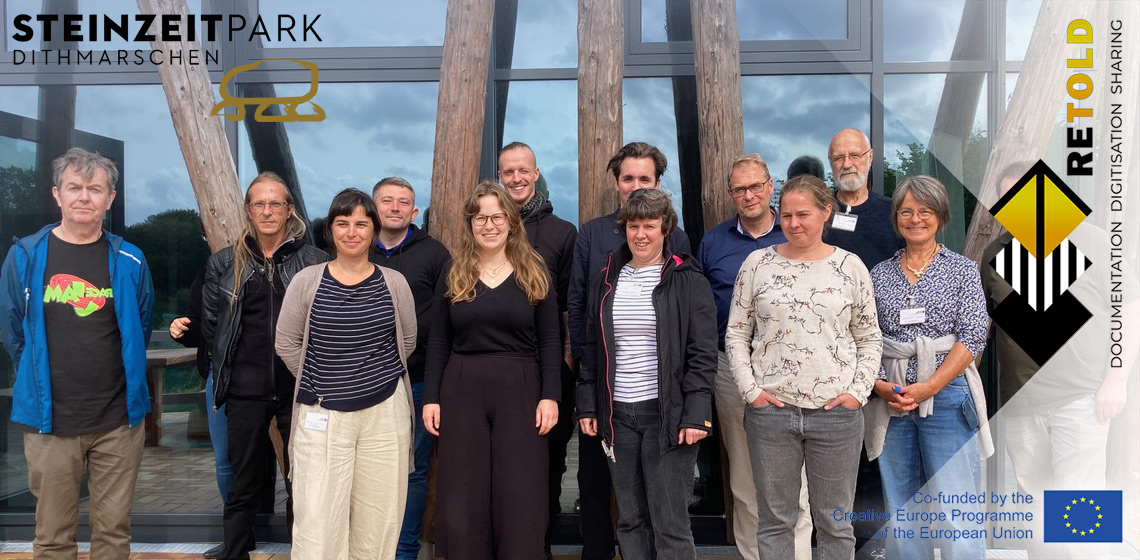The content is published under a Creative Commons Attribution Non-Commercial 4.0 License.
Unreviewed Mixed Matters Article:
RETOLD: Review of the Meeting at the Stone Age Park Dithmarschen, Albersdorf, September 2023

At the end of September 2023 the third face-to-face meeting of the partners from the RETOLD-project took place in Albersdorf in Northern Germany, hosted by the Stone Age Park Dithmarschen (Steinzeitpark Dithmarschen). The meeting took place in the recently opened new museum “Stone Age House” and in the open-air area of the Museum. The Stone Age Park Dithmarschen presents the oldest history in this region of Middle Europe, beginning with Palaeolithic times with reindeer hunters at the end of the ice age, continuing with the Mesolithic times of the last hunter-gatherer societies and ending, finally, in the Neolithic “village” of the first farmers. Special attention is given to educational work in front of the visitors.
This “penultimate meeting” was mostly an internal project meeting. The objective of this meeting was a practical test of the RETOLD App at its current stage of development, producing analogue and digital data about house structures and crafts and putting this into the RETOLD system. Intensive discussions about the relevance of this app, about its usability, and theoretical and practical reflections about further development and the need for future steps took place.
18 September 2023
The first day of the meeting started with an official and public opening, in which representatives from the county of Dithmarschen and from the municipality of Albersdorf welcomed the participants. Dr Roeland Paardekooper (director of EXARC) introduced the guests to the content and the idea of the RETOLD Project, followed by Dr George Tomegea from the ASTRA Museum (Sibiu, Romania) who presented the results of the SWOT analysis of the use of digital tools in the three partner museums. The official part of the meeting ended for the day with an introduction to the Stone Age Park Dithmarschen and a guided tour held by Dr Rüdiger Kelm.
19 September 2023
The second day started with a “walkthrough” of the existing documentation app and a discussion about points which have to be optimized (content wise and further programming). Museums and technical experts reported in this session led by Cordula Hansen and Shay Gilna from XYZ (by Nüwa) about their experience of using the app and about the different media types.
Before lunch Lukas Städing from the digiCult-network (Kiel, Germany), which is developing and maintaining practical solutions for the storage of digital data from cultural institutions, started the round table about the management of the digital material in a professional way, as an external expert. Questions of handling different data sources and about the correct protection of rights on pictures, videos and other digital data were important topics. The focus of this day was house documentation. In the afternoon we continued this discussion, took minutes and thought about different tasks for the different partners. We also took into account technical questions of how to implant the app practically for further use, and for other museums.
20 September 2023
On the third conference day the partners focussed on questions about the 3D-photogrammetry model production from houses and other built structures and used the open-air area of the Stone Age Park for testing. They also reflected on the craft documentation in the app and necessary changes and additions for the improvement of the documentation boxes.
In the afternoon questions about editing and publishing the digital data was on the agenda: What form? What platform? What would a museum expect (also in terms of the project results in general), How to maintain and sustain the platform in the future, after the end of the official project? How to disseminate our results to our museum colleagues, when the app is working?
21 September 2023
The fourth day was focussed on the evaluation of the points discussed so far. Here the partners produced a list of different tasks and assigned them to the responsible institutions for these next steps.
After that there was time to use different technical methods of documentation (drone, video, photos) in practice in the Stone Age Park. A large variety of data were uploaded on this day to the Google form of the RETOLD project.
In the afternoon the responsible RETOLD partners had a Steering Committee Meeting, in hybrid form (with partners from Nüwa and UAB taking part online per zoom). Here we summed up the state of the project and set out the next project steps with a time table.
To conclude, the meeting in Albersdorf was important for the progress of the project, especially in determining the next concrete steps and tasks. Questions about technical use, additional content and further testing for the next months were resolved. The partners were also trained practically in the use of data production and documentation with different methods.
Keywords
Country
- Germany

